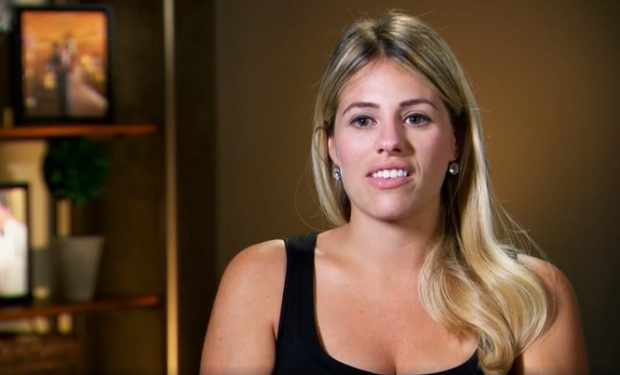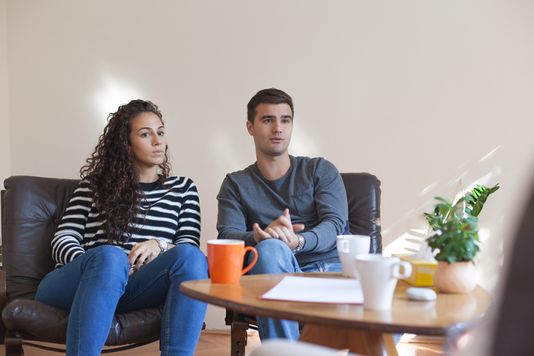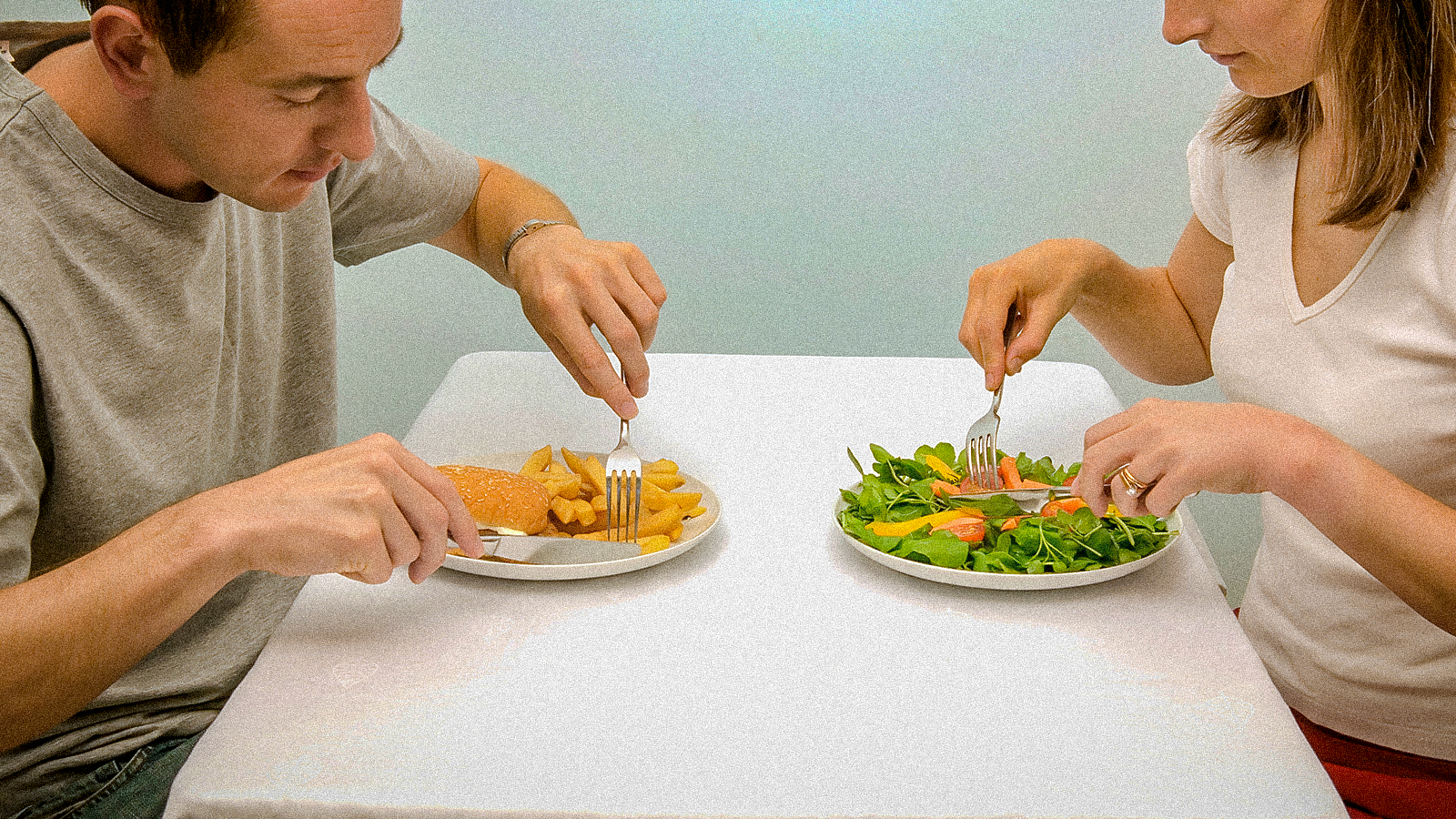Category Archives: marriage advice
Married at First Sight: Ashley Petta “Not Okay” With Marriage Advice

In the Married at First Sight: Happily Ever After episode “Lost in Transparency,” after a relaxing retreat, the couples get back to work on their relationships. While Shawniece and Jephte from Season 6 struggle with their marriage (they separated), Ashley’s main complaint is that her husband Anthony has a hard time taking things more seriously. When Ashley’s told by a marriage counselor “you’re never going to be the same person” and that Ashley should “respect the difference,” Ashley asks in disbelief, “So I have to be okay with that?”

Sure, being pregnant changes the dynamics of a marriage but Ashley should count her blessings. It’s not like Anthony is sleeping around with other women (Jephte!), he’s just having innocent fun. Having a sense of humor comes in handy when you have your first child! Married at First Sight: Happily Ever After airs Tuesdays at 10 pm on Lifetime, right after Married at First: Honeymoon Island. [Related: Married at First Sight: Ashley Opens Boutique Before Baby Comes]
Distance is straining our once happy marriage

Hi Brenda,
I have been a big fun of your informative column and I would like advice on a burning issue.
I am 32 years old and married to a 25-year-old woman. We have one child. We’ve been married for three years. I love my spouse and my son so much to a level that I find it difficult staying away from them. However, she recently got a job in a different county far from where I work.
Before she started working our relationship was good and we had open communication and strong intimacy. We did many things together and constantly consulted one another; and even if we had different opinions on an issue, we would agree on the way forward within a short time.
However, this has changed. Communication has become a strain. Sometimes I can call my wife the whole day and she does not pick or return my calls. And when she does pick my calls, she seems uncomfortable talking to me or not interested in talking to me.
I struggle to visit my family every week, travelling a distance of more than 300km on Friday nights and back on Sunday nights, and I rarely have time to relax. But surprisingly, when I visit, my wife seems not to be concerned or even interested in anything about me.
When I want to be intimate, she claims that she is too tired or sleepy. Is this normal? What could be the problem?
Thank you so much for reading!
I want to be honest with you, but I don’t feel like this is good news, so I’m going to put it in the best way possible – the straightforward way.
Something is going on with your wife, and I don’t know what it is. It’s inspiring that you were so close and loved each other so well.
The distance is definitely not helping, but the fact that you are still trying to maintain the intimacy you once knew means something.
Have you tried asking her point blank what is going on? Her behaviour is abnormal, and that kind of abnormal change is triggered by something. I just hope it’s a something and not a someone. I hope this all works out in the end.
Marriage counseling stalls

Adapted from a recent online discussion.
Hi, Carolyn: At what point do you know it’s time to end a marriage? I found out almost a year ago that my spouse had cheated. We have a young child, and I initially stayed because of our kid. We’re in counseling and both doing everything the counselor says, and spouse is doing everything I ask, sometimes without me asking, and trying to meet my needs. We’re both working on ourselves, too.
But my heart is not in it. I think my heart was in it at the beginning, but now that the shock has worn off, I’m just feeling blah about the whole thing. Is this part of the process? Our counselor says it is, and we can try to get through it, but I wake up every day wishing I was waking up alone.
I’m not even angry; I just don’t like the person I’m waking up next to. I feel like I’m wasting my time. I talk to the counselor about all of this, and she tried to be upbeat about getting past it, but it hasn’t been getting better.
— Should I Stay or Should I Go?
At this point I would be asking the therapist what the basis is for her optimism — besides her apparent preference that you stay married? (Problematic if true.)
If your current unhappiness is indeed just one stage in a longer process, then what are the other stages she has seen? And what is the general emotional pathway from anger to “I just don’t like the person” to feeling love?
I won’t say “feeling love again,” because there’s no going back, there’s only forward, which will be new regardless of what it is.
Read more:
If you don’t hear anything from your therapist in response to these questions that you find promising, and if this period of blah dislike is lasting for months without relief, then it’s time for a new therapist and/or a trial separation. Especially with a child, it’s important to move as gradually as you can, and separation is a key step between uninterrupted-months-of-stalled-therapy-and-unhappy-wakeups and ending a marriage.
Just talk to a lawyer before you do anything. Small missteps can have huge consequences.
Re: Stay or Go:
You might also want to try a different therapist. From the way you describe it, it sounds like she is negating how you feel, by repackaging your feelings as “part of the process.”
— Anonymous
Fair point, thanks. Even without that, stuck is stuck and reason enough to consider a change.
Dear Carolyn:
I am a high school teacher. My department chair, “Ken,” occasionally makes laminated signs for everyone in our department to hang on our walls. He uses some special cardstock with historical figures and scenes.
Ken likes to use Comic Sans font and, more often than not, his signs include a typo or grammatical error. If these signs were not made with the special cardstock, I wouldn’t hesitate to reprint my own. Fear is holding me back from rooting through his office when he’s not there to find the cardstock. What should I do?
— A Sign
NO NOT COMIC SANS!!!
Tell him you found a typo and ask if he’d like you to reprint it for him. Everyone needs an editor.
Email Carolyn at tellme@washpost.com, follow her on Facebook at www.facebook.com/carolyn.hax or chat with her online at noon Eastern time each Friday at www.washingtonpost.com.
Read or Share this story: https://www.freep.com/story/life/advice/2018/11/06/marriage-counseling-cheating/1834278002/
Science says your happy marriage is making you fat

Married men and women are more likely to be overweight than single people even though they are also more likely to monitor their diets and eat healthier food. How is this possible? Research indicates that partnered people wind up with love handles because people love them. Happy relationships lead to weight gain because meals are shared and partners feel secure. Fat and happy is, according to science, a real phenomenon.
The combination of commitment and cohabitation may have everything to do with relationship weight gain — newlyweds gain four to five pounds on average in their first year — but researchers have historically struggled to pinpoint clear mechanisms that explain the girthiness of the joyfully committed.
“Happy couples eat healthier but weigh more. This is the finding of our study which is consistent with other previous studies but not all,” explains Stephanie Schoeppe, a Senior Postdoctoral Research Fellow at Central Queensland University who recently released what might be the most authoritative study on in-relationship spread. “However, our study examined a large population sample — over 15,000 adults — hence our findings provide a significant insight into this topic.”
Schoeppe is getting closer to unraveling the mystery of the fat and happy? How? She and her team pooled data from the annual Queensland Social Survey, that included 15,001 adults. Questionnaires tracked if people were married or single, as well as a number of lifestyle factors such as whether or not they smoked, how often they exercised and ate vegetables and their BMIs. Results revealed that couples smoked less, ate less fast food, and did not drink as much alcohol compared to single people. And yet they were less likely to be within a normal weight range than singles.
Schoeppe found that couples were more likely to plan meals around quality time together and that, although family meals were linked with greater fruit and vegetable consumption, they were also linked to larger portions and more consumption across the board. Single people eating alone tended to consume less. Likewise, it’s possible that couples are more willing to gain weight because they’re not trying to attract a new mate in the market. The study did not look at if relationship happiness made people weigh more or less or look at fluctuation over time. Schoeppe plans to look at how additional variables may affect how much couples gain weight as well, like age.
“We are currently working on a follow-up study that examines whether the associations between relationship status and healthy lifestyle factors differ by age,” she says.
While the study did not look at the whether or not relationship weight represents a health issue, psychologist Wyatt Fisher, who was not involved in the study, recommends that couples who are concerned about their weight make an effort to exercise regularly and be more conscious of portions. He also recommends that couples have preemptive conversations about weight before it comes up because it likely will at some juncture. It’s important for the sustained happiness of relationships that couples understand how their spouse is likely to react to their changing shape.
“Couples should proactively discuss weight gain early in their relationship to see if it is a concern for either of them and why,” Fisher says. “If it is a concern, couples should discuss how to prevent it from happening, such as making healthy dinners and exercising together.”













